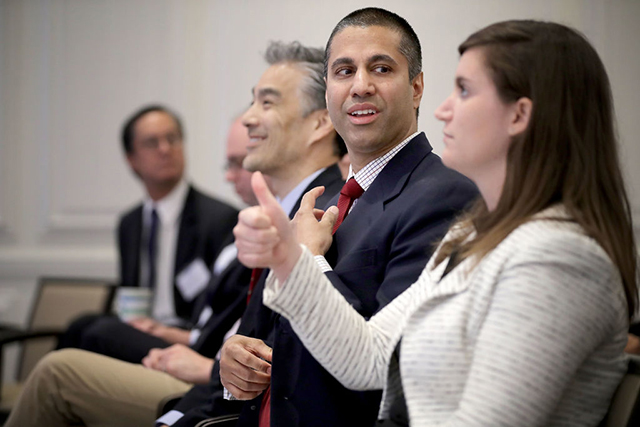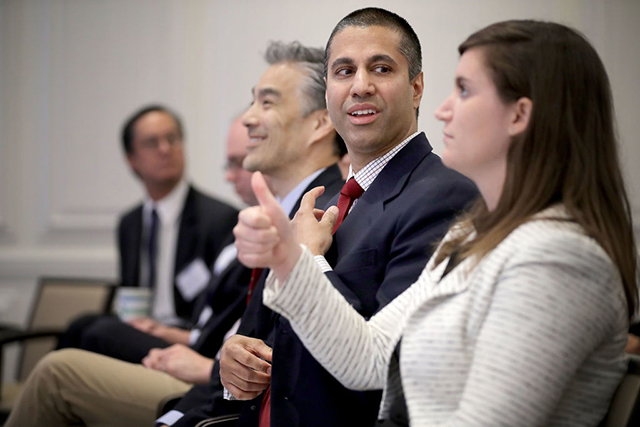
 Federal Communication Commission Chairman Ajit Pai (2nd right) prepares to deliver remarks and participate in a discussion at The American Enterprise Institute for Public Policy Research May 5, 2017, in Washington, DC. (Photo: Chip Somodevilla / Getty Images)
Federal Communication Commission Chairman Ajit Pai (2nd right) prepares to deliver remarks and participate in a discussion at The American Enterprise Institute for Public Policy Research May 5, 2017, in Washington, DC. (Photo: Chip Somodevilla / Getty Images)
The Federal Communications Commission (FCC) is reinterpreting a key law to consider relaxing constraints on telecoms giants.
Republican Chair Ajit Pai this week invoked Section 706 of the Telecommunications Act to argue that smartphones alone could help broadband providers meet statutory requirements on access and deployment.
“We propose to incorporate both fixed and mobile advanced telecommunications services into our Section 706 inquiry,” agency filings said on Tuesday, in a notice of inquiry. The FCC will accept comments on the proposal for two weeks starting on September 7.
Democratic Commissioner Mignon Clyburn criticized the inquiry, describing mobile and home broadband as “complements, not substitutes.”
“Consumers who are mobile only often find themselves in such a position, not by choice but because they cannot afford a fixed connection,” she said.
According to research cited by the Republican majority, 73 percent of Americans subscribe to fixed broadband, while only “13 percent of Americans across all demographic groups are relying solely on smartphones for home internet access.”
Section 706 of the 1996 Telecommunications Act requires the FCC to ensure that “advanced telecommunications capability is being deployed to all Americans in a reasonable and timely fashion.”
The move to reclassify mobile internet access comes amid agency efforts to reinterpret Section 706 rules on competition.
The Commission in April said that only one broadband provider in a service area satisfies antitrust requirements under the law. The declaration could grant telecoms monopolists the authority to charge higher rates to businesses.
Earlier this week, a federal judge refused to enjoin the new interpretation while a lawsuit challenging it is ongoing.
Chairman Pai celebrated the decision by declaring victory despite the unresolved litigation.
“The court’s decision to let our modernization of our business data services rules take effect is an important — though unsurprising — affirmation that the Commission thoroughly analyzed our massive data collection to establish a robust, forward-looking competitive framework,” he said on Tuesday.
In the waning years of the Obama administration, the FCC invoked Section 706 of the Clinton-era law to nullify state laws restricting municipal broadband — high-speed internet access offered by local governments in under-served areas.
In August 2016, a federal appellate court ruled that the agency overstepped its legal authorities by issuing the order.
Our most important fundraising appeal of the year
December is the most critical time of year for Truthout, because our nonprofit news is funded almost entirely by individual donations from readers like you. So before you navigate away, we ask that you take just a second to support Truthout with a tax-deductible donation.
This year is a little different. We are up against a far-reaching, wide-scale attack on press freedom coming from the Trump administration. 2025 was a year of frightening censorship, news industry corporate consolidation, and worsening financial conditions for progressive nonprofits across the board.
We can only resist Trump’s agenda by cultivating a strong base of support. The right-wing mediasphere is funded comfortably by billionaire owners and venture capitalist philanthropists. At Truthout, we have you.
We’ve set an ambitious target for our year-end campaign — a goal of $180,000 to keep up our fight against authoritarianism in 2026. Please take a meaningful action in this fight: make a one-time or monthly donation to Truthout before December 31. If you have the means, please dig deep.